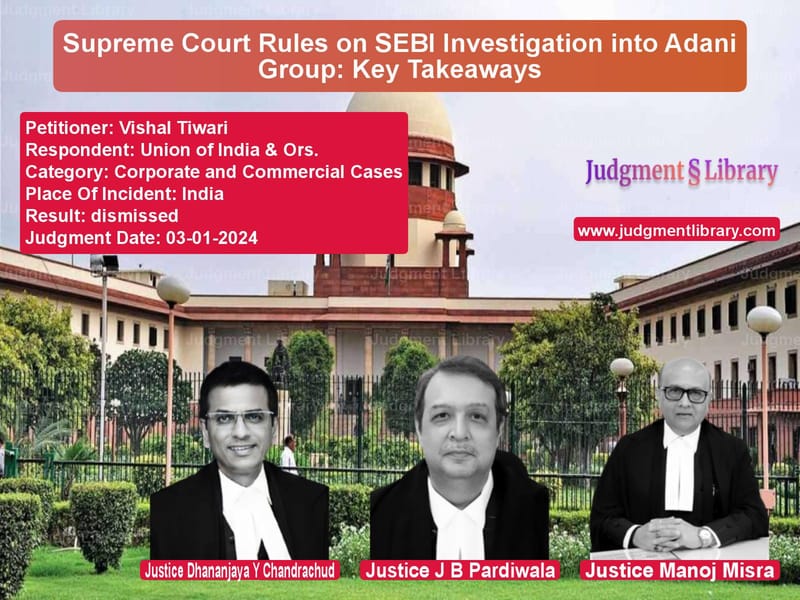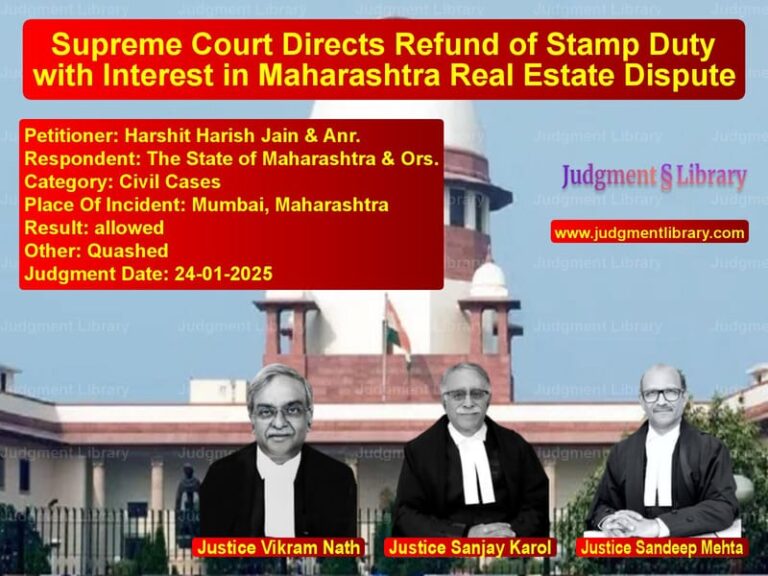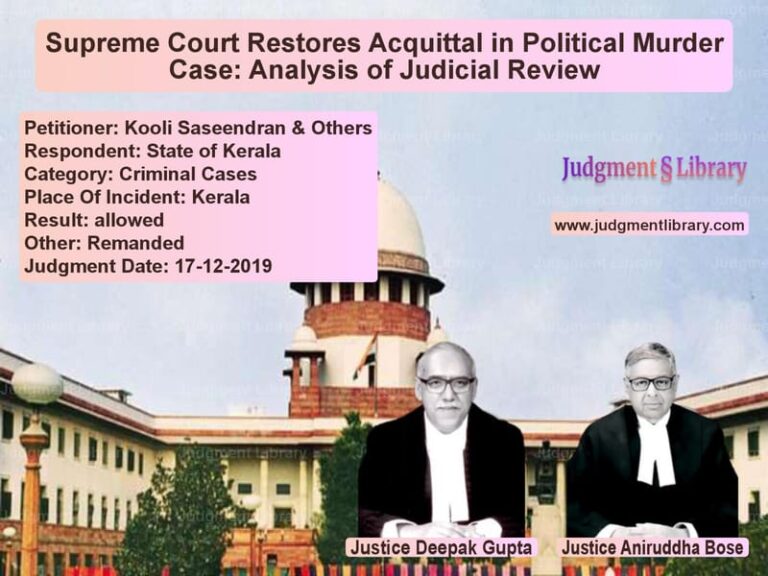Supreme Court Rules on SEBI Investigation into Adani Group: Key Takeaways
The Supreme Court of India has delivered a landmark judgment in the case of Vishal Tiwari vs. Union of India & Ors., addressing allegations concerning the Adani Group following the publication of the Hindenburg Report. The Court examined the role of the Securities and Exchange Board of India (SEBI) in investigating the alleged financial irregularities, regulatory failures, and market volatility caused by short-selling practices.
Background of the Case
The case originated from multiple writ petitions filed under Article 32 of the Constitution, raising concerns about the sharp decline in the Indian stock market following the Hindenburg Report, which accused the Adani Group of stock price manipulation and regulatory violations. The report claimed that the Adani Group failed to disclose transactions with related parties and engaged in financial misconduct.
The petitions called for an independent investigation into SEBI’s regulatory actions and sought court intervention in reviewing India’s financial sector mechanisms. The Supreme Court responded by forming an Expert Committee to examine the allegations and SEBI’s role.
Key Legal Issues
- Whether SEBI failed to investigate the Adani Group adequately.
- Whether the court should transfer the investigation to an independent Special Investigation Team (SIT) or the CBI.
- Whether regulatory amendments made by SEBI weakened financial oversight and facilitated stock manipulation.
- Whether the actions of short-sellers, including Hindenburg Research, contributed to market volatility.
Petitioner’s Arguments
The petitioners, represented by advocate Prashant Bhushan, argued that:
- SEBI had shown regulatory failure by not properly investigating offshore shell companies allegedly linked to the Adani Group.
- The Hindenburg Report and other media investigations revealed stock price manipulation through Foreign Portfolio Investments (FPI).
- The relaxation of SEBI’s disclosure rules facilitated regulatory evasion.
- The role of Life Insurance Corporation (LIC) and State Bank of India (SBI) in Adani Group transactions should be scrutinized.
- The government should revoke amendments to SEBI’s Foreign Portfolio Investors (FPI) and Listing Obligations and Disclosure Requirements (LODR) regulations, which allegedly weakened oversight.
Respondents’ Arguments
The Union of India and SEBI, represented by Solicitor General Tushar Mehta, defended the regulatory framework:
- SEBI had conducted 24 investigations into the Adani Group, of which 22 were completed.
- There was no deliberate delay in the investigation, and the pending cases were due to awaiting inputs from foreign regulators.
- The financial markets remained stable despite volatility in Adani stocks, proving there was no systemic risk.
- The amendments to SEBI regulations had strengthened, not weakened, transparency and oversight.
- Hindenburg Research’s short-selling activities needed to be examined, and SEBI was already reviewing market manipulation risks.
Supreme Court’s Key Observations
“The power of this Court to enter the regulatory domain of SEBI in framing delegated legislation is limited. The Court must refrain from substituting its own wisdom over the regulatory policies of SEBI.”
“The reliance placed by the petitioner on the OCCRP report to suggest that SEBI was lackadaisical in conducting the investigation is rejected. A report by a third-party organization without verification cannot be considered conclusive proof.”
“SEBI has completed twenty-two out of the twenty-four investigations into the allegations leveled against the Adani group. The remaining two investigations shall be completed expeditiously, preferably within three months.”
Final Judgment
The Supreme Court ruled:
- There was no evidence of regulatory failure on SEBI’s part.
- The request to transfer the investigation from SEBI to the CBI or SIT was denied.
- SEBI was given three months to conclude its remaining investigations.
- Hindenburg Research’s role in short-selling should be investigated to determine if its activities violated any laws.
- The Union Government and SEBI should consider the recommendations of the Expert Committee to strengthen investor protection.
Implications of the Judgment
The ruling has major implications for financial regulation and investor confidence:
- Judicial Restraint on Financial Oversight: The Court reinforced that market regulation should be left to specialized agencies like SEBI.
- Investor Protection Strengthened: The judgment emphasized the need for transparency in stock market transactions.
- Scrutiny of Short-Selling Practices: The Court signaled increased oversight of market volatility caused by short-sellers.
- Reforms in Disclosure Regulations: The ruling encouraged SEBI to continue refining regulatory mechanisms to balance investor confidence and corporate governance.
Conclusion
The Supreme Court’s ruling in Vishal Tiwari vs. Union of India underscores the balance between financial regulation and judicial oversight. While SEBI was directed to complete its pending investigations, the Court declined to interfere in its regulatory autonomy. This decision reassures investors of a structured regulatory approach while emphasizing the importance of market stability and financial integrity.
Petitioner Name: Vishal Tiwari.Respondent Name: Union of India & Ors..Judgment By: Justice Dhananjaya Y Chandrachud, Justice J B Pardiwala, Justice Manoj Misra.Place Of Incident: India.Judgment Date: 03-01-2024.
Don’t miss out on the full details! Download the complete judgment in PDF format below and gain valuable insights instantly!
Download Judgment: vishal-tiwari-vs-union-of-india-&-ors-supreme-court-of-india-judgment-dated-03-01-2024.pdf
Directly Download Judgment: Directly download this Judgment
See all petitions in Corporate Governance
See all petitions in unfair trade practices
See all petitions in Shareholder Disputes
See all petitions in Judgment by Dhananjaya Y Chandrachud
See all petitions in Judgment by J.B. Pardiwala
See all petitions in Judgment by Manoj Misra
See all petitions in dismissed
See all petitions in supreme court of India judgments January 2024
See all petitions in 2024 judgments
See all posts in Corporate and Commercial Cases Category
See all allowed petitions in Corporate and Commercial Cases Category
See all Dismissed petitions in Corporate and Commercial Cases Category
See all partially allowed petitions in Corporate and Commercial Cases Category







